Discover the Women of the Hall
These are the Inductees of the National Women’s Hall of Fame. Select any of the women to discover their stories and learn how they have influenced other women and this country.
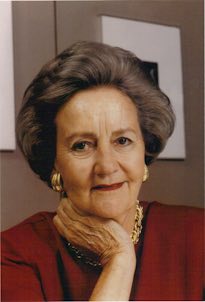 Katharine Graham
Arts, Business
1917
New York
2002
Katharine Graham
Arts, Business
1917
New York
2002

Katharine Graham
As publisher and then Board Chair and CEO of the Washington Post, Graham became one of the most influential women in the country. Her courageous decisions to publish the Pentagon Papers and to proceed with the Watergate investigation earned her a reputation as a daring and thorough journalist, willing to take risks in order to give the American people full access to important information.
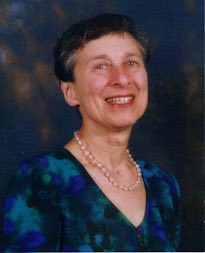 Barbara Holdridge
Arts, Business
1929
New York
2001
Barbara Holdridge
Arts, Business
1929
New York
2001

Barbara Holdridge
Barbara Holdridge is the co-founder of Caedmon Records, the first commercially successful project to record and distribute the works of living authors as well as recordings of past literary works by distinguished actors.
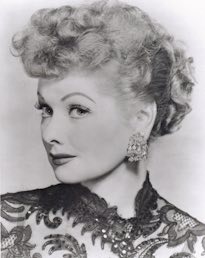 Lucille Ball
Arts, Business
1911
New York
2001
Lucille Ball
Arts, Business
1911
New York
2001

Lucille Ball
Undoubtedly one of the best known and best loved television comediennes of all time. The “I Love Lucy Show”, which began in 1951, is still shown in reruns in more than 70 countries around the world. She was a television pioneer who excelled both in the acting and the production aspects of television.
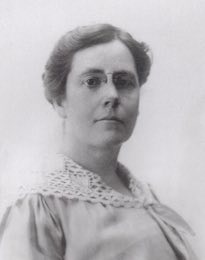 Marian de Forest
Arts, Humanities
1864
New York
2001
Marian de Forest
Arts, Humanities
1864
New York
2001

Marian de Forest
Founder of Zonta (1919, Buffalo, NY), a worldwide organization of women business and professional leaders dedicated to improving the legal, political, and economic status of women. Membership now runs 35,000 with 1,214 clubs in 68 countries.
 Ida Tarbell
Arts
1857
Pennsylvania
2000
Ida Tarbell
Arts
1857
Pennsylvania
2000

Ida Tarbell
Writer and editor, her expose of the Standard Oil Trust in the 1904 publication The History of the Standard Oil Company prompted the federal government to prosecute and break up Standard Oil for anti-trust violations. She founded the American Magazin, authored several biographies, and, in spite of her 1912 anti-feminist book, The Business of Being a Woman, remains a role model for women and men in journalism.
 Eudora Welty
Arts
1909
Mississippi
2000
Eudora Welty
Arts
1909
Mississippi
2000

Eudora Welty
One of the most significant writers of the 20th century, Eudora Welty won many notable literary prizes, including the Pulitzer Prize for her novel The Optimist’s Daughter. Her work is marked by what critic Jonathan Yardley called an “abiding tolerance…a refusal to pass judgment on the actors in the human comedy,” and it transcends generations and national boundaries. In 1998, the Library of America recognized her literary accomplishments by honoring her as the first living author published in the prestigious Library of America series.
 Maya Angelou
Arts
1928
Missouri
1998
Maya Angelou
Arts
1928
Missouri
1998

Maya Angelou
Poet, author and early Civil Rights advocate. Angelou’s early career was in the theater, and she co-wrote Cabaret for Freedom to raise funds for the Southern Christian Leadership Conference, for which she later became northern coordinator. She raised social consciousness through writings such as I Know Why the Caged Bird Sings and The Heart of a Woman. She was a nominee for a Tony, an Emmy, and a Pulitzer Prize.
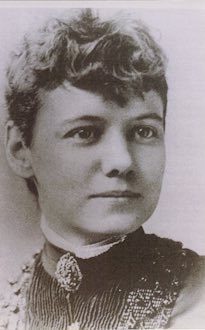 Elizabeth Jane Cochran
Arts
1864
Pennsylvania
1998
Elizabeth Jane Cochran
Arts
1864
Pennsylvania
1998

Elizabeth Jane Cochran
Trail-blazing journalist considered to be the “best reporter in America” who pioneered investigative journalism.
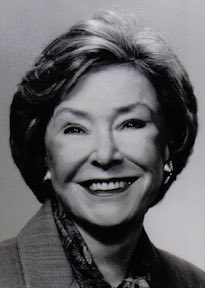 Joan Ganz Cooney
Arts, Business, Education
1929
Arizona
1998
Joan Ganz Cooney
Arts, Business, Education
1929
Arizona
1998

Joan Ganz Cooney
Founder of the Children’s Television Workshop for Public Television and creator of Sesame Street. Cooney created a study for the Carnegie Corporation on the possible use of television for preschool education. Acting on her own findings, she solicited funds to develop a program for television. For this, she was the winner of the Emmy and Peabody Awards, along with other honors.
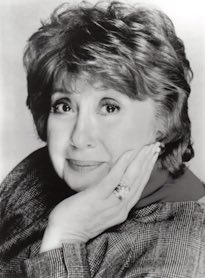 Beverly Sills
Arts
1929
New York
1998
Beverly Sills
Arts
1929
New York
1998

Beverly Sills
Acclaimed Soprano who became the first woman General Director and then President of the New York City Opera, and later first woman chair of the Lincoln Center for the Performing Arts, guiding the Center to become one of the nation’s most important institutions. She was not only directly responsible for the discovery and launch of many young performers, but was also actively involved in a myriad of humane works, including the National Victim Center and (as National Chair) the March of Dimes Mothers March on Birth Defects.
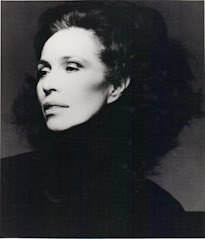 Maria Tallchief
Arts
1925
Oklahoma
1996
Maria Tallchief
Arts
1925
Oklahoma
1996

Maria Tallchief
Prima ballerina with the New York City Ballet and artistic director for the Lyric Opera Ballet in Chicago. Tallchief created a distinctive style and interpretation which continues to influence contemporary ballet. She used her international acclaim to bring about greater understanding and appreciation of Native Americans.
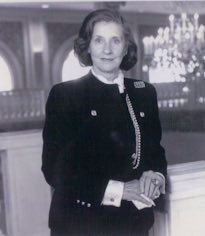 Wilhelmina Cole Holladay
Arts, Business, Philanthropy
1922
1996
Wilhelmina Cole Holladay
Arts, Business, Philanthropy
1922
1996

Wilhelmina Cole Holladay
Founder of the National Museum of Women in the Arts in Washington, D.C., which brings national and international attention to the vast achievements of women in art.
 Anne Morrow Lindbergh
Arts, Science
1906
1996
Anne Morrow Lindbergh
Arts, Science
1906
1996

Anne Morrow Lindbergh
Author of numerous elegant essays, journals and other books. Lindbergh also excelled as co-pilot and navigator with her husband Charles on their historic flights to promote the development of international aviation.
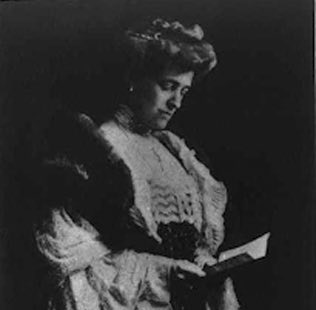 Edith Wharton
Arts
1862
New York
1996
Edith Wharton
Arts
1862
New York
1996

Edith Wharton
American novelist and short story writer of the 20th century. The first woman to receive the Pulitzer Prize for fiction (for The Age of Innocence, 1929), Wharton was a prolific writer who averaged more than a book a year after the age of 40 until her death.
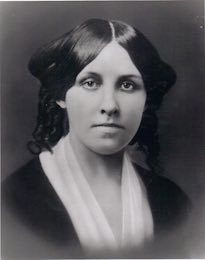 Louisa May Alcott
Arts
1832
Pennsylvania
1996
Louisa May Alcott
Arts
1832
Pennsylvania
1996

Louisa May Alcott
Author who produced the first literature for the mass market of juvenile girls in the 19th century. Her best-known work, Little Women, has appeared continuously in print since its first publication in 1868-69.
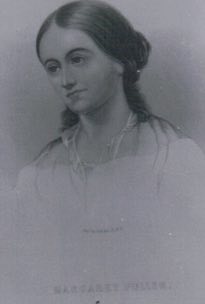 Margaret Fuller
Arts
1810
Massachusetts
1995
Margaret Fuller
Arts
1810
Massachusetts
1995

Margaret Fuller
Literary critic, editor, teacher and author. Fuller’s early writings inspired leaders of women’s rights. She was editor of the The Dial, a Transcendental journal, and she advocated liberation for all humanity.
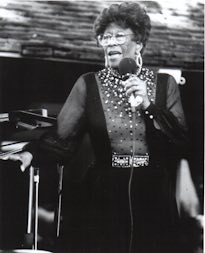 Ella Fitzgerald
Arts
1917
Virginia
1995
Ella Fitzgerald
Arts
1917
Virginia
1995

Ella Fitzgerald
World-renowned jazz singer and the first pop musician awarded the Lincoln Center Medallion. At 15, she entered a talent contest to dance. Her knees shook so much during the contest, she chose to sing instead and was discovered by a Chick Webb band member.
 Charlotte Perkins Gilman
Arts
1860
Connecticut
1994
Charlotte Perkins Gilman
Arts
1860
Connecticut
1994

Charlotte Perkins Gilman
Philosopher, writer, educator and activist who demanded equal treatment for women as the best means to advance society’s progress. Her landmark Women and Economics (1898) argued that until women gained economic independence, real autonomy and equity could not be achieved.
 Zora Neale Hurston
Arts
1891
Alabama
1994
Zora Neale Hurston
Arts
1891
Alabama
1994

Zora Neale Hurston
Novelist, anthropologist and folklorist who contributed greatly to the preservation of African American folk traditions and to American literature. Hurston’s best known works include Their Eyes Were Watching God and her autobiography, Dust Tracks on the Road.
 Oprah Winfrey
Arts, Business, Philanthropy
1954
Mississippi
1994
Oprah Winfrey
Arts, Business, Philanthropy
1954
Mississippi
1994

Oprah Winfrey
The first Black woman to own her own television production company and who became television’s highest-paid entertainer. She is an advocate for ending child abuse, and she contributes generously to colleges and universities.
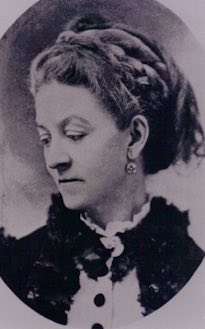 Jane Cunningham Croly
Arts
1829
England
1994
Jane Cunningham Croly
Arts
1829
England
1994

Jane Cunningham Croly
Journalist and driving force behind the American Club women’s movement that inspired thousands of women into a wide range of social reform activities. Probably the nation’s first woman syndicated columnist, Croly was also the founder of the General Federation of Women’s Clubs.
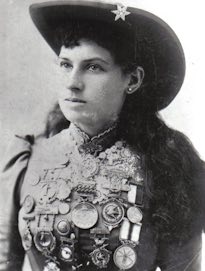 Annie Oakley
Arts
1860
Ohio
1993
Annie Oakley
Arts
1860
Ohio
1993

Annie Oakley
Markswoman, was probably the nation’s finest. A performer for many years with Buffalo Bill’s Wild West Show, Oakley was a staunch supporter of other women’s opportunities and raised funds to send needy women to college and nursing school.
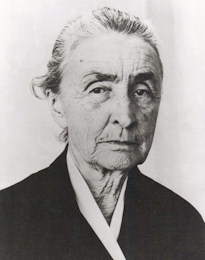 Georgia O'Keeffe
Arts
1887
Wisconsin
1993
Georgia O'Keeffe
Arts
1887
Wisconsin
1993

Georgia O'Keeffe
Artist and perhaps the best-known American woman painter. An American original in both her lifestyle and painting, O’Keeffe produced works of high energy and vision throughout her long life.
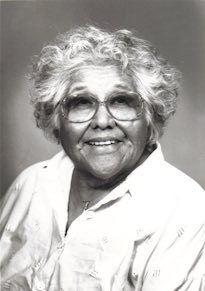 Katherine Siva Saubel
Arts, Education, Humanities
1920
California
1993
Katherine Siva Saubel
Arts, Education, Humanities
1920
California
1993

Katherine Siva Saubel
Founder of the Malki Museum at the Morongo Reservation in California. Born on a reservation in great poverty, Saubel became determined to preserve her tribe’s culture and language, despite overwhelming odds. A learned ethno anthropologist, Saubel was a founder of this first museum run by Native Americans.
